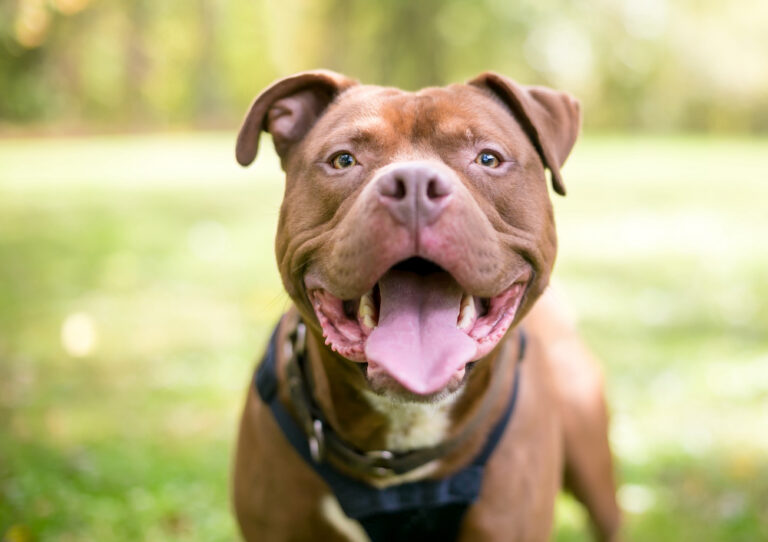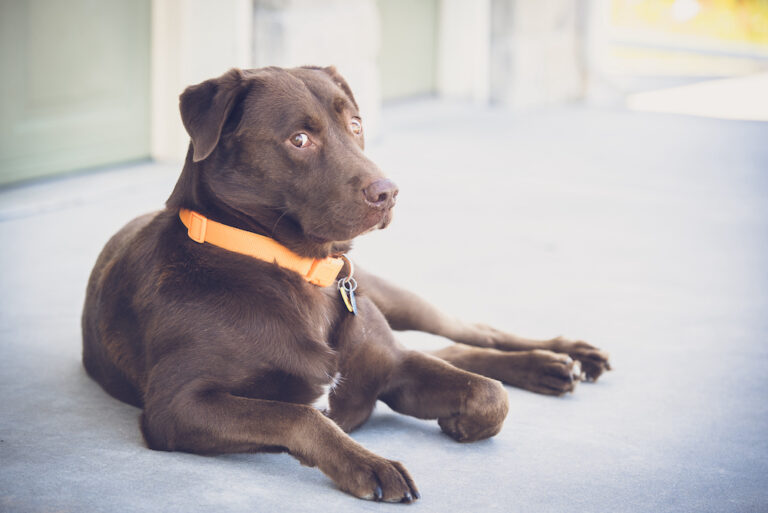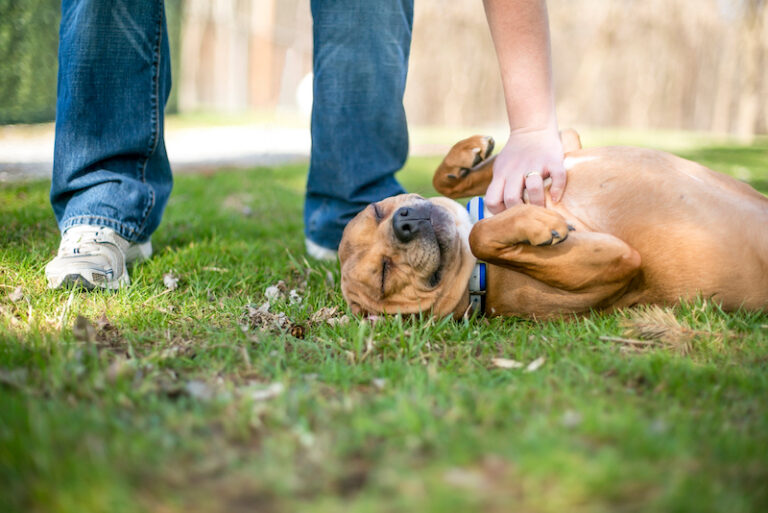On a species-wide basis, the idea that dogs are humans’ best friends makes sense. Thousands of years of evolution, plus selective breeding, have favored gregarious, cooperative pups who can get along with people. But there’s no guarantee that a particular dog will inevitably and immediately shower you with love if you bring them into your home. Individual dogs come with their own histories and dispositions, and they don’t automatically know our expectations for them.
The internet is littered with questions from dog owners who are worried that their pups don’t like them—perhaps because they shun physical affection or make a habit of keeping their distance. How can those experiencing this dilemma tell whether their dogs are fond of them? And, if they need to work on their rapport with the dogs in question, what steps should they take? To answer these queries, we asked experts for their insights on the significance of an apparent canine cold shoulder.

Maybe everything is fine
Dr. Marc Bekoff, professor emeritus of Ecology and Evolutionary Biology at the University of Colorado, Boulder, says that popular culture and the media sometimes promote myths about dogs. One of them (and it’s a big one): the idea that dogs love “unconditionally,” and that “if the dog doesn’t seem to love you, there’s something wrong with the dog.” In reality, dogs have minds and feelings of their own. While dogs can and do love people, and your dog may indeed love you, any given dog is not always going to be in the mood to cuddle or play at any given moment.
Dr. Bekoff gives an example of a rescue dog he used to live with. “She seemed to like us,” he remembers, “but she needed downtime. And every now and again she would just walk down the steps and go behind the bed… At first I was worried—‘Oh, there’s something wrong.’ And then there was nothing wrong. She just needed some away time. I don’t know if it was related to the way in which she was raised. And then she’d come out and be her normal, happy husky self.”
If you’re concerned that a dog isn’t psyched to play or receive belly rubs whenever you are, it could just be that the pup in question has different preferences than you. Dogs have different personalities.
Dr. Zazie Todd, author of Wag: The Science of Making Your Dog Happy (and the upcoming Purr: The Science of Making Your Cat Happy, for readers with feline friends), says: “there are some dogs that won’t be so keen on physical affection, and maybe they’d rather sit next to you on the settee rug and not sit on your lap, for example. That part applies to my dog,” she adds, laughing. “I would rather he sat on my lap, but he would rather sit next to me. So that’s fine. That’s up to him.”
A dog who doesn’t meet every demand you have of a loving pet doesn’t necessarily like or love you any less. Research by Dr. Greg Berns, a professor of psychology at Emory University, found increased activity in the “reward center” of dogs’ brains when they smelled their owners’ scent. Dr. Brian Hare, a professor of evolutionary anthropology at Duke University, has said that the chemical activity in dogs’ brains when they gaze at their owners suggests that, for them, it’s the equivalent of “hugging you with their eyes.” But try explaining that to Frasier.
So: If your dog’s behavior hasn’t changed much, and they aren’t showing signs of stress or aggression, their disagreements with you about when it’s time for play or pets may just be the way they are. There’s no need to take that personally. As Dr. Bekoff says, “It’s not all about you.”
Maybe your dog is sick or injured
If your dog is acting differently than you’re used to, and you can’t figure out an explanation, it might be a good idea to visit the veterinarian. The same way that humans can show signs that they’re irritated if they have headaches or stomach aches, for example, physical discomfort can impact dogs’ behavior. The major difference is that dogs cannot explain how they’re feeling.

Maybe your dog is new around here
If you’ve just brought home a dog, remember your first days in a new office, neighborhood, or school, and magnify that by a lot. Humans take time to open up to one another, so why not dogs?
If a dog seems not to trust you or want to be around you, they could be frightened—of you, of a change to their circumstances, of people in general, or of something else.
“Certainly there are fearful dogs who don’t want to come near you,” says Dr. Todd. “It’s important to respect that and give the dog space and choices,” she says. “And then, of course, they can learn to like you.” Dr. Todd continues: “When you bring home a rescue dog, there is always that bit at the beginning when they’re a bit unsure of you because so much has changed in their life. You have to give them time to settle in, choices, and lots of positive experiences, and give them time to learn that they’re home.”
Dr. Todd says that, with a new dog, patience is key. “It can easily take six months for a dog to completely settle in if they’ve come from another household,” she says. “Some dogs have changed hands several times before they end up being adopted out to another home, and that’s a lot of change that they’ve been through.”
Maybe you’re upsetting your dog
Dr. Bekoff says that another harmful misconception about dogs is the idea that they live entirely in the present. “They really don’t,” he says. “They remember the things that we’ve done for them, both good and bad.” Have you unintentionally harmed your dog? Caused them pain? Yelled at them? They may remember these things, and it could take work to rebuild trust.
Dr. Todd again emphasizes the importance of giving your dog choices whenever possible as you strive to build a positive relationship. This even goes for the most well-intended actions, like displays of affection. “One of those choices we should always give them,” she says, “is whether we get to pet them or not.” One way to give a dog this choice is through a “consent test.” Whatever you’re doing to your dog, stop for a bit and see their reaction. If they look away or walk somewhere else, they probably don’t want any more of that affection. “If they liked what you were doing,” Dr. Todd says, “they will make it obvious that they want more of it… maybe they will lean into you, or they will paw at you for more.” She also notes that most dogs don’t like hugs, and would prefer a pet on the chest or shoulders. For much more on hugs, including how to tell if your dog likes them, read our full guide.
Watch your dog’s body language for clues that they might not like something you’re doing. Dr. Todd says that this is especially important for children. “Small children aren’t very good at reading dogs’ body language,” she says, “and if they see the dogs’ teeth, there’s research that shows that they think the dog is smiling—when actually the dog might be showing signs of stress or fear. They need an adult there to supervise and make sure that it’s safe.”
Beyond physical affection, different sounds, smells, or habits could bother a dog. Signs like lip licking, a dog turning their head away, or a lowered tail may indicate that your dog dislikes something you’re doing. Whether you’re practicing an instrument, watching a loud movie, or arguing with a relative, your dog can see and hear what you’re doing around them—and may have a reaction.

Maybe your dog is bored
Routine can benefit dogs, but they can also get bored if nothing ever changes. They need physical and mental workouts to be happy. If your dog seems to be in a rut, see if they get excited by a little variety. When we talked to Sarah Ruckelshaus of Mid-Atlantic Border Collie Rescue for our guide to the breed, she emphasized the need to stimulate their minds. “It’s fun to play ball,” she said, “but don’t throw that ball for an hour—because that’s not thinking behavior.” She recommended working an intellectual challenge into border collies’ workouts. While every dog is different, mixing things up can encourage them to get more engaged. Dr. Bekoff offers some suggestions for a dog who’s down in the dumps: “Vary their day, the games they play, or the food.” And make sure they’re getting company. “A lot of it,” Dr. Bekoff says, “comes down to how long the dog is left alone, and in what situation.”
Maybe something else happened
Because we don’t see our dogs all day, every day, it’s possible that something we missed has impacted their state of mind. Dr. Bekoff recalls when his friend’s dog seemed to undergo an instant personality change. “He was an outgoing, gregarious little dog,” Dr. Bekoff says, but had become withdrawn. His humans took him to the vet, who performed a full physical and X-rays without finding anything of concern. Later, the dog’s owners saw that an iron in the room where they did laundry had fallen to the floor, and they pieced together that their dog had become frightened when the object fell to the floor. It took a few days, but the dog eventually returned to “his old obnoxious, rambunctious self.”
You may never find out about everything that upsets your dog, but it’s important to make your best attempt at empathizing with them. We related a story to Dr. Todd about an affectionate dog who stayed away from her owner for several days while he was sick, and she responded by talking about the importance of smell to dogs. “Try to see things from the dog’s perspective,” she says. “Smell is very important to dogs, so it could well be that someone’s smell changes when they’ve got a fever, and that might make the dog feel a bit stressed.”

“How can I get a dog to like me more?”
If we’re not getting everything we want out of our relationship with a dog, what can we do?
One option, if a dog seems to be hesitant around unfamiliar people, is to try counterconditioning—using high-value treats to slowly acclimate them to their presence so that they associate those people with good things. “Any time a dog is afraid of something,” says Dr. Todd, “counterconditioning is one of the techniques that you’d be considering.” If the dog is a stranger to you, be patient and let them make the first move.
If you’re making any mistakes outlined in the sections above—yelling at the dog, for example, or roughhousing with them—stop behaving in the ways that they find disagreeable.
At a certain point, you may have to accept that a dog doesn’t express themselves the way you want them to. The relationship you have with your dog doesn’t have to look exactly the way you envisioned—or be just like the relationships you’ve had with other dogs—for it to be a good one. And you can work to strengthen your bond. “Every dog is different,” says Dr. Todd. “If they like hanging out near you, that’s good enough. And if you’re not happy with your relationship, do good, nice, fun things with your dog—like going for walks, giving them sniffing time on the walks, playing tug, taking them to classes if they like classes. Just hanging out together… that will help you to build a better relationship with them.”
The post Does My Dog Like Me? appeared first on The Farmer's Dog.
Comments
Post a Comment